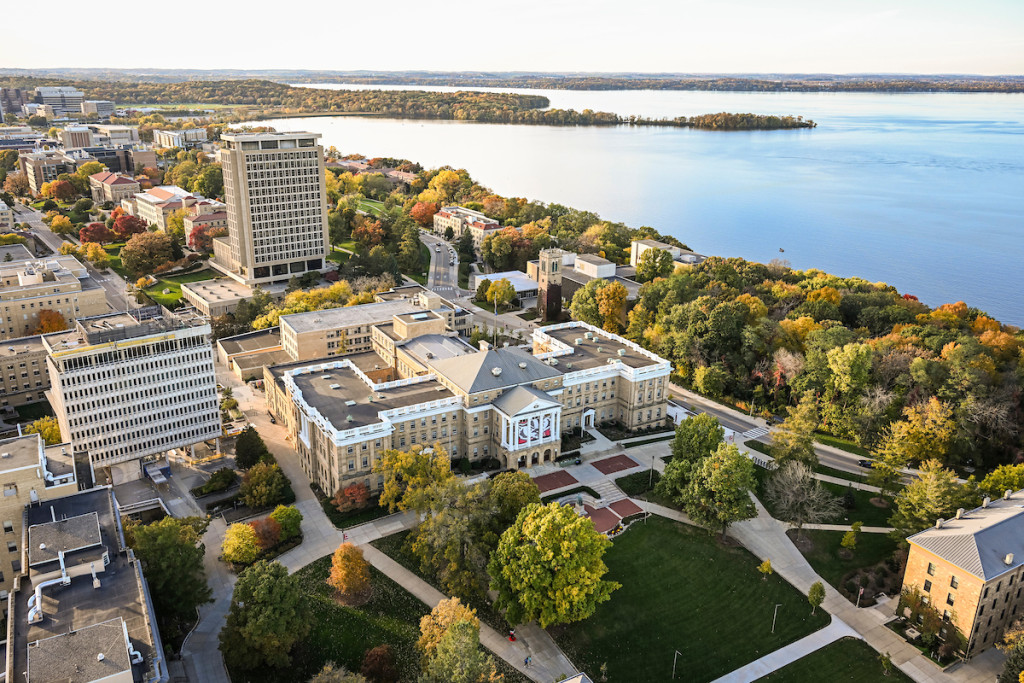New mentorship program offers support, community for Indigenous graduate students

A new group will provide support and mentorship for Indigenous graduate students across the UW–Madison campus. Photo: Jeff Miller
With new funding from the National Science Foundation Innovations in Graduate Education grant, Indigenous scientists and educators at UW–Madison are formalizing support and mentorship for Indigenous graduate students on campus.
The grant provides approximately $1 million over four years to support the Center for Indigenous Research to Create Learning and Excellence (CIRCLE), which will be overseen by Judith Simcox (Crow; assistant professor, Department of Biochemistry), Danielle Yancey (Menominee/Santee; director, Native American Center for Health Professions), Jeneile Luebke (Mashkiiziibii; assistant professor, School of Nursing) and Lauren W. Yowelunh McLester-Davis (Oneida; scientist and director of Indigenous Science Advocacy).
“This [program] really arose from regular meetings with the Native American Center for Health Professions and discussing how we could build something better for the next generations of students,” Simcox says. “Indigenous people believe in honoring the generations that came before them and serving the generations that come after them in actions and decisions. When Indigenous UW–Madison faculty members met to support the Indigenous graduate students, they realized they needed to guide them in navigating academia.”
Native Americans account for 2.9% of the United States’ population and are drastically underrepresented in scientific research, constituting just less than 0.4% of masters and doctoral students according to the NSF. Of the Indigenous students enrolled in graduate school, only a quarter complete their degree. Data for Indigenous students at UW–Madison mirrors national numbers.
“The rate at which Indigenous graduate students are graduating from our university is not on par with graduate students of different races and ethnicities,” says McLester-Davis.
While the reasons for student attrition vary, a consistent obstacle for Indigenous graduate students is a lack of systematized and targeted support. Historically, the burden of providing support has fallen to graduate students, who must seek out additional mentorship from Indigenous faculty, and on faculty, who provide academic and emotional support to Indigenous graduate students beyond their own programs and laboratories.
“You can have an advisor or committee member who is completely supportive and a great ally,” says Elena Hill, a member of the Oneida Nation and a graduate student in the agroecology Program. “There’s a certain way of being seen and understood — like you are back home — that is hard to find outside of your community. I feel an obligation for my career to help and aid my community. That motivates every single decision I make as a researcher. With mentorship and support from Indigenous faculty, staff and other graduate students, it takes a burden off me having to figure out for myself how to explain that to the scientific community.”
CIRCLE aims to support Indigenous students throughout their time in graduate school, and in turn, improve graduation rates and increase the number of Indigenous scientists contributing to STEM knowledge. The program will connect students with Indigenous faculty members; provide training for academic advisors; hold weekly lunch meetings and other opportunities for students to share about their research and experiences; and provide support for interdisciplinary approaches to community-centered Indigenous science. CIRCLE will also distribute microgrants to support community involvement and participation in Indigenous students’ research.
McLester-Davis emphasizes that CIRCLE will meet the unique needs of UW–Madison’s Indigenous graduate students. “Indigenous students get asked a lot of them. Being at school means being separated from community and family and their spiritual and traditional teachings, and students don’t always have time to practice their traditional ways of being. That physical separation, along with the challenges that come when academic mentors don’t understand or aren’t familiar with your culture, can impact their ability to be healthy and accomplish their academic goals in this environment.”
CIRCLE will learn from and build on the support and mentorship that NACHP in the School of Medicine and Public Health provides for Indigenous health professional students. NACHP’s mission is to improve health outcomes and address the healthcare workforce needs in communities. CIRCLE echoes this same mission while also broadening the scope to include graduate students in science, social science and related fields where Indigenous scholars are also needed.
Jennifer Jones, a Diné/Navajo graduate student in the Nelson Institute for Environmental Studies, hopes that CIRCLE will be a step towards a future with more Indigenous researchers who can work closely with communities, scientists and lawmakers to address issues of environmental justice and work towards a more sustainable future.
“Researchers like me can bridge the gap between academic literature and tribal government leaders. We can bridge the gap between people who are educated in the way we are here at UW–Madison and people who are educated in traditional knowledge,” says Jones. “Our future depends on how we communicate with communities, how we address people who are impacted by issues of environmental justice, and how we think about sustainable energy systems.”
CIRCLE is open to all Indigenous graduate students, including those in professional degree programs, at UW–Madison. Students who wish to get involved in CIRCLE and advisors who wish to learn more should contact Lauren W. Yowelunh McLester-Davis.
Tags: graduate students, indigenous



